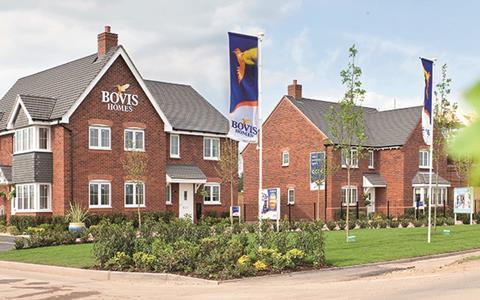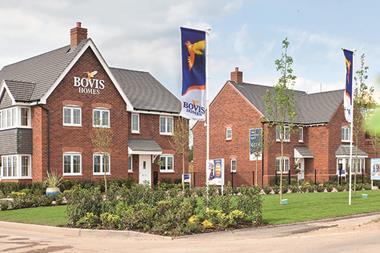My DIY achievements have ranged from workmanlike (my deck) to farcical (completing a radiator circuit… minus a 90-degree elbow, resulting in the unexpected appearance of a basement swimming pool).

Fixing a leaking housebuilder seems much more daunting, but somehow the new boss of Bovis makes it sound like a breeze.
Greg Fitzgerald was parachuted in as chief executive of Britain’s fifth-largest build in the wake of a profit warning on 28 December and a media exposé into late delivery and shoddy quality of its homes.
This led the shares to fall by 12% in less than two months (while rivals saw their prices appreciate by a similar margin) and prompted the departure of predecessor David Ritchie. This triggered opportunistic takeover bids in March from Redrow and then Galliford Try, which, ironically, Fitzgerald had previously run before “retiring” in 2015 at the unlikely age of 51.
The turnaround looks quicker, if less dramatic, than Redrow’s following Steve Morgan’s triumphant return in 2009. Galliford’s shares rallied by 5% when Fitzgerald’s appointment was announced on 5 April and continued to trend upwards, then leapt by 10% on his maiden results presentation on 7 September.
Not only was the prognosis for the health of the underlying business more encouraging than many investors had expected, but the statement predicted faster dividend growth than expected and a swathe of special dividends.

Useful lessons
During the presentation, Fitzgerald outlined Bovis’s defects and his approach to ‘de-snagging’ the company. There were several useful lessons for executives facing similar challenges in property companies:
- Keep it simple. He brought none of the flow charts beloved by some of the industry’s incoming chief executives: “A simple organisation is a damn sight easier to fix and quicker to fix than a complicated one.” The real problems generally derived from execution and management structures, not the underlying assets or people. Several activities will now be outsourced and growth targets pared back. Squeaky floors, for instance, had been customers’ chief complaint. Solution: lay joists every 400mm instead of 600mm.
- Delivery. A sprawling management structure and unrealistic growth target meant “chaos” trying (latterly unsuccessfully) to hand homes over before June and December financial period ends.
- Customers first. The barrage of media scrutiny had shown homes being handed over months late and the company had scored only two out of five stars in the industry’s customer satisfaction survey. Current experience now suggests four. A new ‘customer experience director’ has been lured from Virgin Atlantic and 94% of staff have been put on service training. Importantly, housing associations had to be won back.
- Empower employees. In his tour of all 90 sites, Fitzgerald met “virtually all employees” plus much of the supply chain. Churn among critical site managers had been over 50%; now it is around 20% and the aim is to cut it further. Latest staff surveys have shown improved morale.
- Tighten controls. Fitzgerald noticed the worst-performing outlets were generally furthest from regional headquarters. “In Mercia, we inadvertently stumbled on one of our stock properties [ie, finished or almost finished].” He said it looked forgotten and probably unsellable and that, group-wide, financial reporting and forecasting were lax. But Fitzgerald wasn’t fazed by what he found. “As an ex-estimator, I think I’m more than well qualified to assist with that,” he said.
- Tighten the balance sheet. A good problem to inherit was a strong land bank and a flabby balance sheet. “I think that’s actually worked against Bovis. It’s actually taking away a lot of the dynamism that a group of this size needs.”
An example was stock properties stayed on the books much longer than necessary. Return on capital employed (ROCE) is the industry’s benchmark; having formed his own developer in his late 20s, Fitzgerald once remarked that he had always been mindful of keeping a tight rein on ‘CE’, much of it his original investment.
The land bank will be shrunk from four years of supply to three and a half, and non-core assets will be sold or put into joint ventures.
One potential spot of rain on his parade was his use of the words “cyclical downturn”, a term shunned by rivals. It’s not imminent, he insisted, but from around 2020, it will become increasingly inevitable. Bearing in mind that at the peak of the last boom he was probably the first housebuilding boss to utter the ‘D’ word when at Galliford, this might have sounded ominous. But, as any DIYer or ex-chancellor will attest, it’s better to “fix the roof while the sun is shining”. Just remember to check the pipework.





























No comments yet